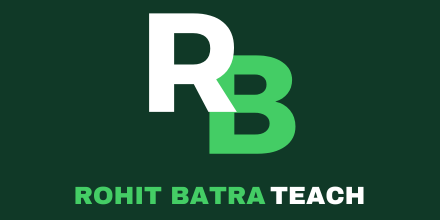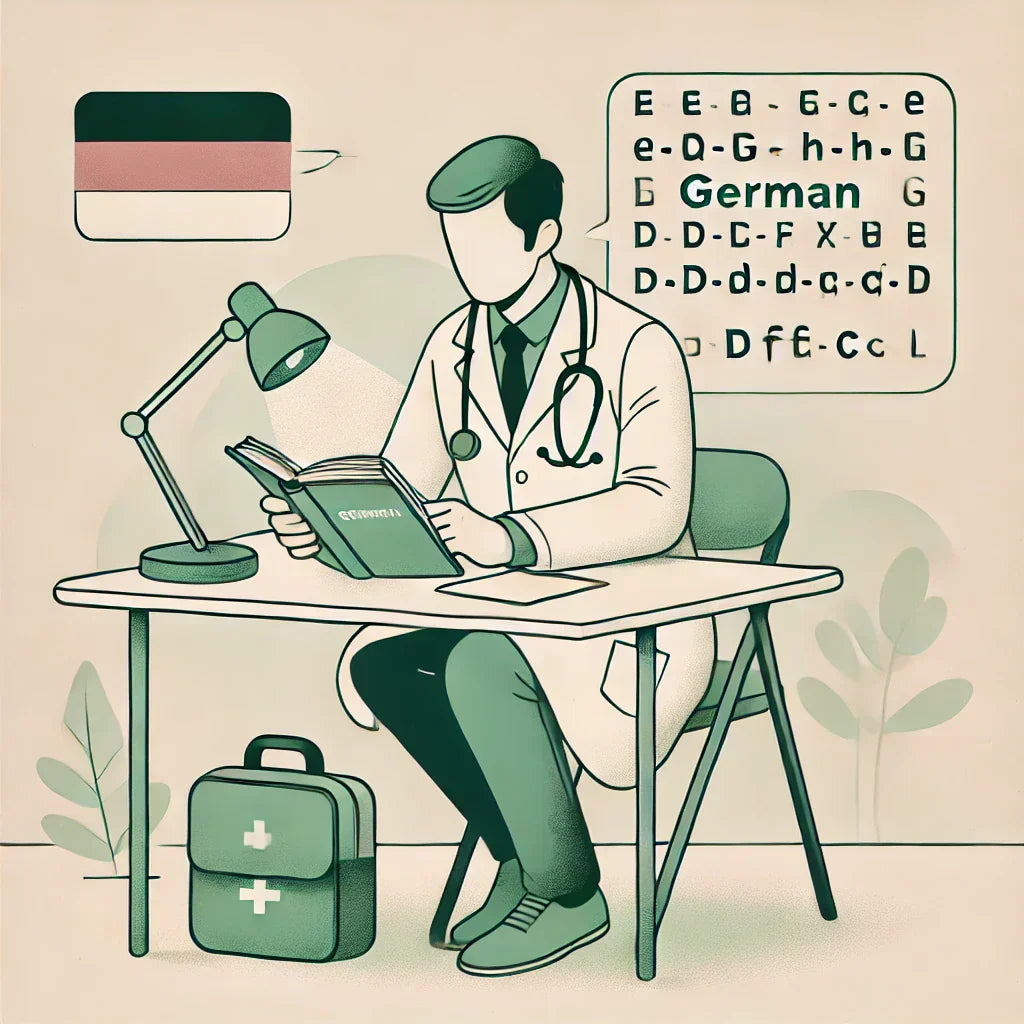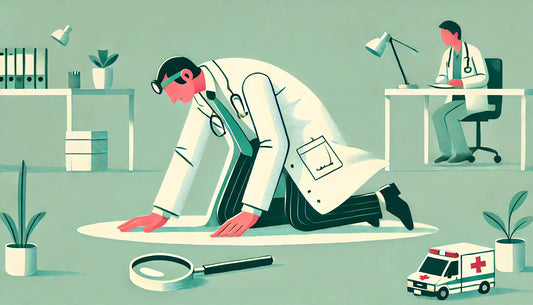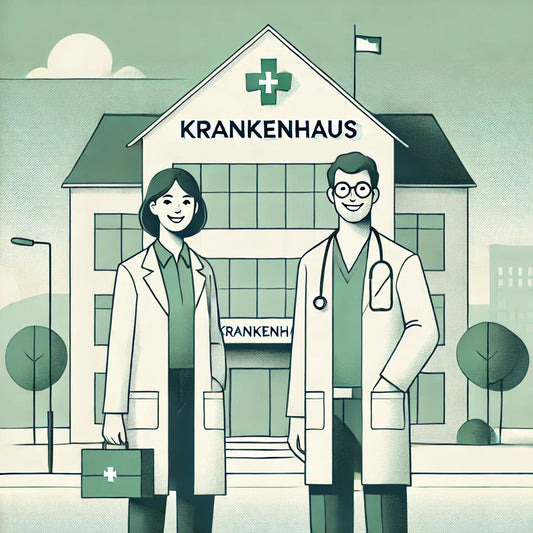As a foreign medical graduate aspiring to start a medical residency in Germany, mastering the German medical Language is one of the critical hurdles you’ll face. This proficiency is vital not only for effective communication with patients and colleagues; it is also a key component of passing the Fachsprachprüfung (FSP), a medical language exam that is required to obtain a permanent medical license (Approbation) in Germany.
This blog will delve into the importance of mastering Medical German, provide essential tips for adequate preparation, and highlight resources that can support you in passing the Fachsprachprüfung in your first attempt.
Understanding the FSP Exam (Fachsprachprüfung)
The Fachsprachprüfung is designed to test your ability to communicate effectively in Medical German. The FSP exam for foreign doctors typically includes three parts:
- Doctor-Patient Conversation: You will take a simulated patient’s medical history (Anamnese), demonstrate empathy, and explain medical procedures or treatments.
- Documentation: Based on the patient interaction, you will write a medical report. This will test your ability to summarise medical information accurately in German.
- Doctor-Doctor Conversation: You will discuss the patient’s case with another doctor, demonstrating your ability to use technical medical Language correctly.
- Medical German Translations: You are required to translate 10 formal medical German terms into common German.
Passing this exam is mandatory before you can obtain your Approbation, making it a crucial step in your journey to becoming a licensed medical practitioner in Germany. It is also a hurdle you must pass before you can reap the benefits of working as doctor including earning the fantastic doctor salary in Germany.
Preparing for the FSP Exam for Success
Medical German is more than just translating words from English to German; it involves understanding the context and nuances of medical communication. Here are some essential terms and phrases you will encounter:
- Anamnese (Medical History): When taking a patient’s history, questions like “Haben Sie irgendwelche Vorerkrankungen?” (Do you have any pre-existing conditions?) are common.
- Diagnose (Diagnosis): After evaluating a patient’s condition, you might say, “Die Diagnose lautet Diabetes” (The diagnosis is diabetes).
- Therapie (Treatment): Explaining treatment plans to a patient could involve phrases like “Wir werden eine medikamentöse Therapie beginnen” (We will start a medication-based treatment).
These terms are only a small part of the whole picture. Mastering them requires consistent practice and exposure.
Why Mastering Medical German is Crucial for Foreign Doctors
Imagine you are in a busy German hospital, surrounded by medical professionals discussing patient cases in a language that feels alien. The inability to understand or contribute effectively not only hampers your performance but also diminishes the quality of patient care you can provide. This is where the mastery of Medical German becomes indispensable. Medical German is your gateway to integration into the German healthcare system. It enables you to:
- Communicate accurately with patients, ensuring they understand their diagnoses and treatment plans.
- Collaborate efficiently with medical staff, from nurses to senior consultants, to provide the best care.
- Document medical histories, diagnoses, and treatment plans correctly, which is crucial for legal and medical standards in Germany.
In essence, without proficiency in medical German, you cannot fully function as a healthcare provider in Germany, which is why passing the Fachsprachprüfung is mandatory.
How to Start the FSP Exam Preparation
- Medical German Courses: Sign up for specialised courses focusing on medical terminology and patient interaction. These courses often include interactive sessions and practical exercises, which are invaluable for preparation.
- Clinical Rotations and Hospitations: Observerships or clinical rotations in German hospitals (Hospitations) offer hands-on experience in using Medical German. Engaging with patients and medical staff in a clinical setting helps solidify your language skills.
- FSP Vocab Trainer: The FSP Vocab Trainer is an excellent tool designed by doctors for foreign doctors. It provides over 100 medical terms categorised by body systems, with formal and informal translations. The integrated audio feature allows you to listen to native pronunciations, making it easier to practice and retain the terms. The best part is that you can start your FSP preparations from the comfort of your home.
- Language Communities: Joining a language community, such as online forums or study groups, can provide additional practice opportunities. These communities often include other foreign doctors who are also preparing for the FSP, providing a supportive environment for learning.
Challenges in Learning Medical German
Learning Medical German is undoubtedly challenging, especially when balancing it with other responsibilities like clinical rotations or family life. Here are some common challenges and how to overcome them:
- Language Barriers: Medical German can be challenging even if you are proficient in general German. Don’t hesitate to seek help from specialised language tutors or online courses focusing on Medical German.
- Time Management: Balancing your time between learning the Language and other responsibilities can be difficult. Create a study schedule that fits your routine and stick to it as much as possible.
- Cultural Differences: Understanding the cultural context of Medical German can be challenging. Engage with German colleagues or join cultural exchange programs to understand these nuances better.
Preparing for the FSP Exam: Step-by-Step Guide
- Start Early: Begin your preparation as soon as possible. The more time you give yourself, the more confident you will be.
- Set Clear Goals: Break down your study material into manageable chunks. Set daily or weekly goals to cover specific topics or systems.
- Practice Real-Life Scenarios: Use role-play to simulate patient interactions. You can do this with peers or language partners. The more you practice, the more natural these interactions will feel.
- Take Mock Exams: Don’t miss this crucial step. It is your chance to ace the Fachsprachprüfung by practising under exam conditions and getting comfortable with the format and time constraints.
- Seek Feedback: Regularly request Feedback from native speakers or experienced professionals. Constructive criticism will help you enhance and refine your language skills.
Tips for Learning Medical German Effectively
Learning Medical German is a gradual process that demands dedication and consistent practice. Here are some strategies to help you master the Language:
- Immerse Yourself in the Language: Surround yourself with German daily. Watch German medical documentaries, read medical journals, and listen to German podcasts. Consistent exposure like this will significantly increase your familiarity with pronunciation and commonly used medical terms.
- Use Structured Vocabulary Lists: Categorise medical terms by systems, such as cardiovascular, respiratory, or neurological. This helps organise your study material and makes it easier to recall related terms.
- Practice Pronunciation: Pronunciation is crucial in Medical German. Mispronouncing a term can lead to misunderstandings in a clinical setting. Record yourself pronouncing complex terms and compare them with native speakers.
- Engage in Active Learning: Practice by explaining medical cases to peers or joining language workshops tailored to Medical German. Real-world application of the Language is the best way to learn.
Prepare for the FSP Exam with Confidence: Team RBT!
Mastering Medical German is not just a requirement for passing the Fachsprachprüfung; it’s a critical step in becoming an influential and respected medical professional in Germany. By immersing yourself in the Language, utilising the right resources, and practising consistently, you can confidently overcome the challenges and pass the Fachsprachprüfung.
Exclusive For High-Achievers: Accelerator Program
The team at Rohit Batra Teach is here to provide exceptional support every step of the way. Here’s how we will assist you:
1. Recognition/ Defizitbescheid
- We help you get your foreign medical qualifications recognized by German authorities and save you up to 6 months and 1000s of euros.
2. Visa Application
- Applying for the correct visa (e.g., § 16d Abs. 1 AufenthG for recognition of foreign qualifications) can be challenging. We guide you to ensure your visa application is accepted, allowing you to focus on your residency preparations.
3. German Language
- Mastering medical German language is essential for practising as a foreign doctor in Germany. Prepare with professional teachers with RBT for medical language exams and attend Hospitations to gain practical language experience.
4. Residency Application
- Once your qualifications are recognised and your language requirements are met, we will help you navigate through the application process, from approbation to residency, help you prepare for interviews.
Designed for high-performing individuals, our goal is to streamline your journey to securing a medical residency in Germany, allowing you to focus on what matters most—your career development.
"Here we support the next generation of foreign medical doctors start a medical residency in Germany. Discover our customised programs designed to accelerate your path to a German medical residency program. Start your journey today!"
Stay in touch 🫶




